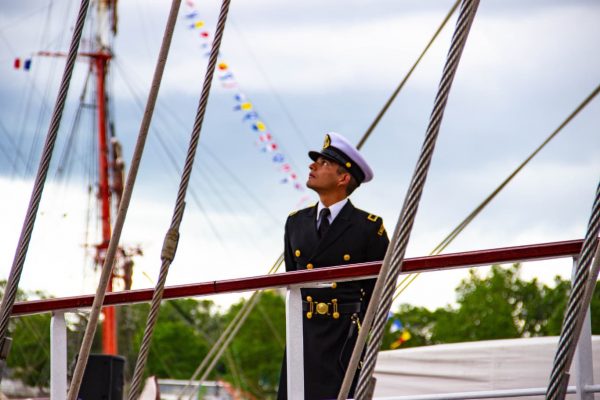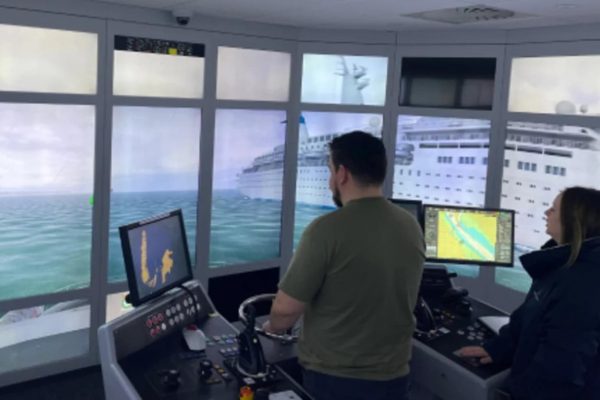The Merchant Navy is the fleet of ships that are engaged in the transportation of cargo and passengers across the seas and oceans. These ships are not operated by any government but rather by private companies and organisations. The merchant navy plays a vital role in the global economy, as it is responsible for transporting a wide range of goods including raw materials, manufactured products, and consumer goods. Merchant ships also play a vital role in the transportation of oil and gas.
The merchant navy is made up of various types of ships, including cargo ships, container ships, bulk carriers, and tanker ships, each designed to carry a specific type of cargo. Merchant sailors, also known as merchant mariners, are the crew members who operate and maintain these ships. They are responsible for tasks such as navigation, cargo handling, and mechanical maintenance.
Merchant navy sailors are required to have specific qualifications and certifications, and the profession is regulated by international maritime laws and conventions. The profession of merchant navy is challenging and demanding, as the sailors have to work for long periods of time away from home, and often in rough weather conditions. However, it can also be rewarding and provides opportunities to travel and see the world.
In this article, we explore:
What Do The Merchant Navy Do?
Where Does the Term “Merchant Navy” Come From?
What’s the Difference Between the Merchant Navy and the Navy?
Who Is In Charge of the Merchant Navy?
Who Are The Largest Merchant Navy Opperators in The UK?
What Do The Merchant Navy Do?
The merchant navy plays a vital role in the global economy, as it is responsible for transporting a wide range of goods including raw materials, manufactured products, and consumer goods. Merchant ships are responsible for moving goods such as oil, gas, coal, grain, timber, and various types of manufactured goods like cars, electronics, and household appliances across the seas and oceans. They also play a vital role in the transportation of oil and gas.
Merchant navy ships are of different types, each designed to carry a specific type of cargo. Some examples are:
- Bulk carriers are used to transport dry bulk cargo like coal, iron ore, and grain.
- Container ships are used to transport cargo in standardised shipping containers.
- Tankers are used to transport liquid cargo like oil, chemicals and liquefied natural gas.
- Ro-Ro ships are used to transport vehicles and other rolling cargo, like trucks and trailers.
- General cargo ships are used to transport a wide range of different types of cargo.
Merchant navy sailors, also known as merchant mariners, are the crew members who operate and maintain these ships. They are responsible for tasks such as navigation, cargo handling, and mechanical maintenance. They also ensure the ship complies with international maritime laws and regulations. The crew of a merchant navy ship is usually divided into different departments, such as deck, engineering, and catering, each with its own specific responsibilities.
Where Does the Term “Merchant Navy” Come From?
The term “Merchant Navy” comes from the historical use of ships owned by private merchants for the purpose of trading and transporting goods across the seas and oceans. These ships were not operated by governments but rather by private companies and organisations and thus were referred to as “merchant” ships. The term “navy” is used in reference to the fleet of ships as a whole, similar to how the term “navy” is used to refer to a country’s military fleet of ships.
The term “Merchant Navy” was first used in Great Britain in the 19th century to distinguish the fleet of merchant ships from the Royal Navy, which was the country’s military fleet of ships. The term became more widely used during World War I and II, when merchant ships played an important role in supporting the war effort by transporting troops and supplies.
Nowadays, the term “Merchant Navy” is used internationally to refer to the fleet of ships engaged in the transportation of cargo and passengers across the seas and oceans. The term is used to refer to the profession of the merchant mariners, the crew members who operate and maintain these ships, and the maritime industry as a whole.
What’s the Difference Between the Merchant Navy and the Navy?
The main difference between the Merchant Navy and the Navy is that the Merchant Navy is made up of ships that are owned and operated by private companies and organisations, while the Navy is made up of ships that are owned and operated by a government.
The primary purpose of the Merchant Navy is the transportation of cargo and passengers across the seas and oceans, while the primary purpose of the Navy is to defend a country’s interests and protect its citizens and territories. The Navy is also often involved in providing security and support to other countries, whereas the Merchant Navy is primarily focused on commercial activities.
Another key difference is that the crew members of the Merchant Navy are known as merchant mariners, while the crew members of the Navy are known as sailors or naval personnel. Merchant mariners are responsible for tasks such as navigation, cargo handling, and mechanical maintenance, while Navy sailors are trained to operate and maintain ships as well as other military equipment and are also trained for combat.
In addition, the Merchant Navy is regulated by international maritime laws and conventions, while the Navy is regulated by the military laws and regulations of their respective countries.
While both the Merchant Navy and the Navy play important roles in the transportation of goods and people, the Merchant Navy is focused on commercial activities, and the Navy is focused on defending a country’s interests and protecting its citizens and territories.
Who Is In Charge of the Merchant Navy?
The Merchant Navy is made up of ships that are owned and operated by private companies and organisations, so the management and control of the Merchant Navy is in the hands of these companies and organisations.
The day-to-day operations of a merchant ship are typically managed by the ship’s captain, who is in charge of navigation, cargo handling, and the overall safety and well-being of the ship and its crew. The captain is also responsible for ensuring that the ship complies with international maritime laws and regulations.
The ship’s management company, which is responsible for the operation and maintenance of the ship, is typically responsible for the recruitment and management of the ship’s crew, and for ensuring that the ship is properly equipped and maintained.
At a higher level, the shipping industry is regulated by national and international laws and regulations, such as the International Convention for the Safety of Life at Sea (SOLAS) and the International Convention on Standards of Training, Certification and Watchkeeping for Seafarers (STCW). These regulations are aimed at ensuring the safety of ships and crew, protecting the marine environment, and promoting fair competition in the shipping industry.
In addition, there are also national and international trade organisations, such as the International Chamber of Shipping (ICS) and the Baltic and International Maritime Council (BIMCO), that represent the interests of the shipping industry and provide guidance on maritime laws and regulations.
Who Are The Largest Merchant Navy Opperators in The UK?
The largest merchant navy operators in the UK are primarily shipping companies and ship management companies. Some of the biggest and well-known companies in the UK merchant navy include:
Maersk: Danish multinational conglomerate which operates in over 130 countries and is one of the world’s largest shipping companies.
CMA CGM: French multinational shipping company.
MSC: Swiss-Italian multinational shipping line, the second largest container shipping company in the world.
P&O Ferrymasters: UK-based company that provides transport and logistics services, including shipping, across Europe.
P&O Cruises: British-American cruise line, which operates cruise ships primarily to destinations around the Mediterranean, North Africa, the Caribbean, North America, and Europe.
Cunard Line: British-American cruise line company, it operates luxury cruise ships, famous for the Queen Mary 2, Queen Elizabeth, and Queen Victoria.
Stena Line: Swedish-British ferry company that operates a fleet of ferries and ro-pax vessels, providing services in the North Sea, Irish Sea, and Baltic Sea.
DFDS: Danish-British shipping and logistics company, operates a network of ferry and freight services across Northern Europe.
These are some of the largest merchant navy operators in the UK. The shipping industry is constantly evolving and the ranking of the companies can change over time.
Find out about joining the merchant navy and take the first step towards a career on the high seas.




